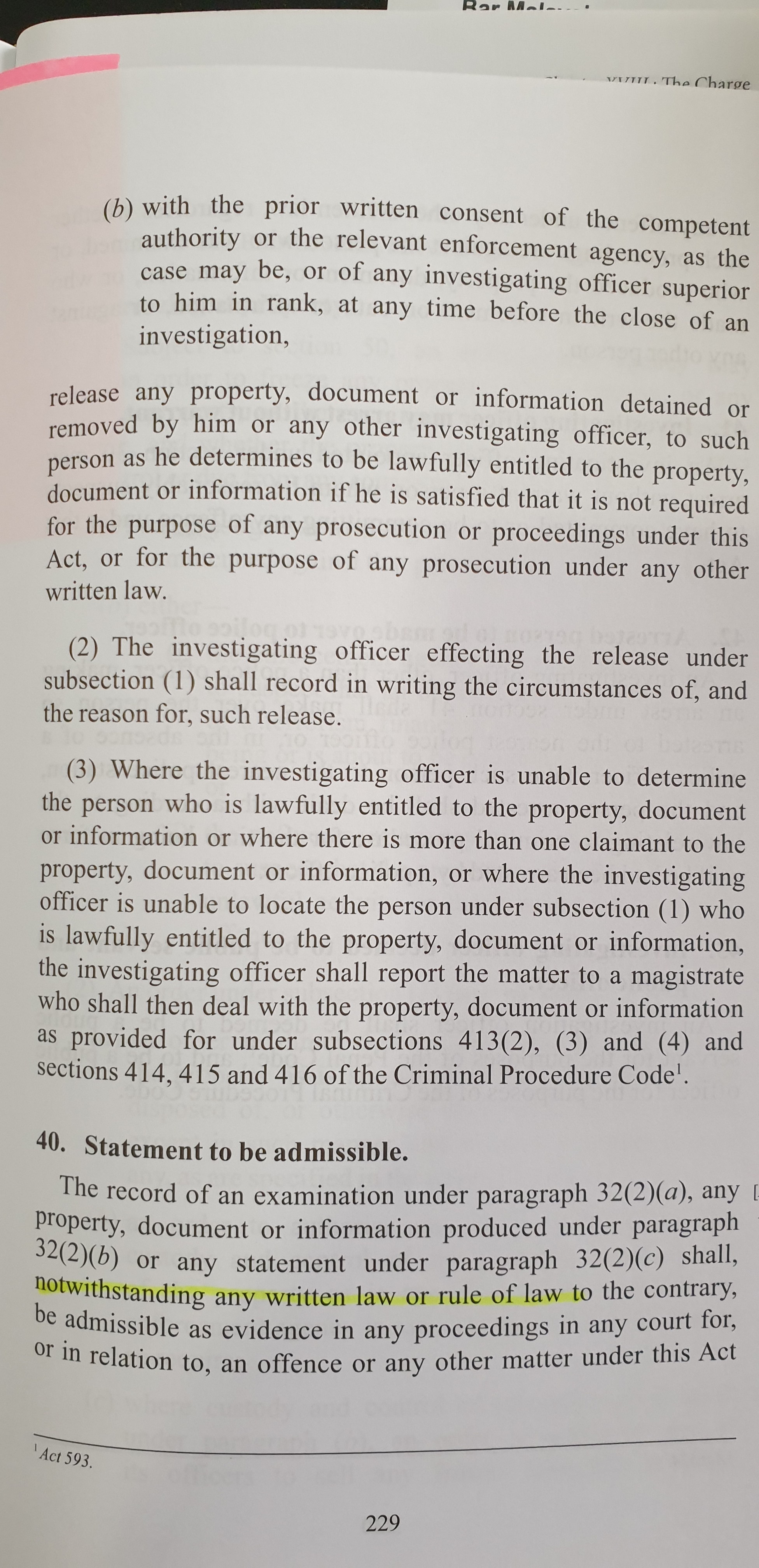
I am contributing my part to a learned legal friend who is in the midst of writing and publishing a book on Anti-Money Laundering, Anti-Terrorism Financing And Proceeds of Unlawful Activities Act 2001. It is commonly known as “AMLA”. Yes Najib, Rosmah, Zaid, Shafie etc are charged under this law. Generally speaking, for a layman, those investigated or charged under this Act are perceived to be a big time criminals (underworld leaders, terrorist, corporate crooks); at least in the monetary sense. Is that so?
In the past, many thought of money laundering as the act of dealing with (“cleaning”) dirty money or black money. That perception is no longer correct, as the present scope of the law (after its 2007 and 2013 amendments) is indeed extremely wide.
The present situation is explained in Bank Negara Malaysia’s official portal as follows: The enforcement of the AMLA is undertaken by various ministries/agencies based on the predicate offences under their respective purview which is listed under the Second Schedule of the AMLA. As at November 2014, there were 356 offences under 42 pieces of legislations listed under the Second Schedule of the AMLA.
Briefly allow me to simply share why this law is indeed a very powerful one.
The following are the reasons:
1. An investigating officer (“IO”) can arrest you without warrant if he “reasonably suspects” you have committed or to be committing any offence under the Act.
2. IO can order you or your family members or friends or colleagues, orally or in writing (ie phone call or whatsapp) to attend before him and furnish any property, document or information. And if you refused the above, you commit an offence and can be liable to a fine up to RM3 million or jail term of 5 years or both !
3. All the above statement, property, document or information shall be admissible as evidence notwithstanding any written law or rule of law !!! (ss 40 & 71)
4. *TAKE NOTE any person engages or deals directly or indirectly in any manner whatsoever; proceeds of an unlawful activity commits an offence under AMLA (the Act practically covers every manner).
You may ask what is “unlawful activity”? Under the law it simply means any “serious offence”. What is then “serious offence”? Under the Second Schedule, it covers almost every transaction that deals with money. Among others it includes betting (yes 4D, EPL, election results), false report by a company, wrongful communication via computer, offer/receive bribes to custom officers, selling products without a direct sale licence or conduct pyramid scheme, incorrect return or evasion of income tax, sales or service tax (!!!), lending money without licence, hunting protected wildlife without licence, failing to declare moneys (amount as declared by BNM) taking in or out of Malaysia etc.
It is generally understood that in criminal cases, the onus is on the prosecution to prove its case beyond reasonable doubt. Under Section 70(2) AMLA, the prosecution remains bound to discharge this heavy duty insofar as it has to prove an offence has been committed.
However, in relation to any other facts, Section 70(1) states that they be decided on the balance of probabilities (which is the standard of proof applicable to civil cases).
Section 4(2) AMLA is an extremely powerful provision. It states that a person may be convicted of an offence of money laundering “irrespective of whether there is a conviction in respect of a serious offence or foreign serious offence or that a prosecution has been initiated for the commission of a serious offence or foreign serious offence.”
This means that a person who is alleged to have committed a serious offence (such as the above example of betting, tax evasion or direct sales offence under the applicable laws) may be convicted for money laundering (under AMLA) even if he has not been prosecuted or convicted for tax evasion or smuggling. The authorities may commence investigations under any of the statutes mentioned in the Second Schedule but may subsequently decide to prosecute the accused under AMLA.
So guys be very careful, basically AMLA can applies to and be used by the authorities against all of us in the country in a loose and flexible manner. Perhaps high time for the parliamentarians to look into this Act or separate it from the genuine money laundering offence and terrorism financing and unlawful activities.




